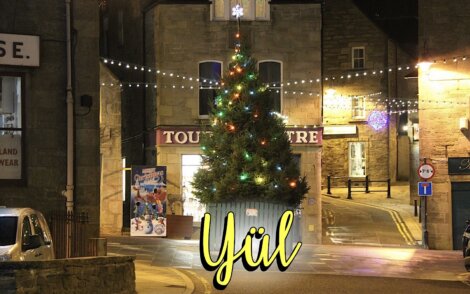Community / Merry Christmas and güd Yül tae you aa!
IT IS Christmas and, appropriately, Shetland language project I Hear Dee is delving into the origins of the word Yül, the 12 days of festivities which is much, much older than all our current traditions and probably dates back to pre-Christian times.
For us this is a good way for our small team to round off what has been another very busy news year. We want to thank all our many readers, supporters and advertisers for their loyalty during 2022 and wish them all a peaceful Christmas and a happy New Year.
Provided the power stays on and the snow keeps at bay, we will take a much-needed break during those 12 days of Yül festivities. Full services will resume on 4 January 2023.
The origins of the word Yül (in Shaetlan):
History athin a wird. Shetland micht be spokken aboot as bein remote but da truth is it’s ey been a central plaess, an trowe da history o Shaetlan contact wi idder languages is nivver aised.
Da wird Yül (Yøl/Yöl; or Yule athin StE) is a braaly aald Germanic wird. In Aald English hit wis geól (airlier hit wis geohol), in Aald Norse hit wis jól, de’r a Gothic form jiuleis attestit, an even a Aald Anglian giuli. Dey aa derive fae da Proto-Germanic *jeul-/*jeXul-/*jehwlą. Da meanin is debaetit, hit micht’ll a bøn ‘da festivities’, an wis set tae mean da winter saison (fae aboot December til Janiwirry). Whaar it cam fae afore dat we dunna ken. Da Aald Norse jól meant da pre-Christian foy at lestit 12 days idda herthol o da winter.
Fae IHD wi love: a Güd Yül tae you aa! W’ir hoopin at da New Year fins you blyde an in fine fettle.
Become a member of Shetland News
And here is the English translation:
History in a word. Shetland may be described as remote but in fact it has always been a central place, and the history of Shaetlan is one of constant contact with other languages.
The word Yül (Yøl/Yöl; or Yule in StE) is a very old Germanic word. In OE it was geól (earlier geohol), in ON it was jól, there is a Gothic form jiuleis attested, and even an Old Anglian giuli. They all derive from the Proto-Germanic *jeul-/*jeXul-/*jehwlą. The meaning is debated, possibly ‘the festivities’, and designated the winter season (roughly December and January). The ultimate origin is unknown. The ON jól designated the pre-Christian feast lasting 12 days at the height of winter.
From IHD with love: a Happy Yule to you all! May the New Year bring you all health and happiness.
Run by linguists Dr Viveka Velupillai and native Shaetlan speakers Roy Mullay, Julie Dennison and Andrew Blance, the I Hear Dee project aims to document and describe the contemporary use of the distinctive language variety.
In researching the history of the local tongue, the I Hear Dee team offers insights into the origin of the local language and how far travelled some of the words and phrases in regular use are.


























































